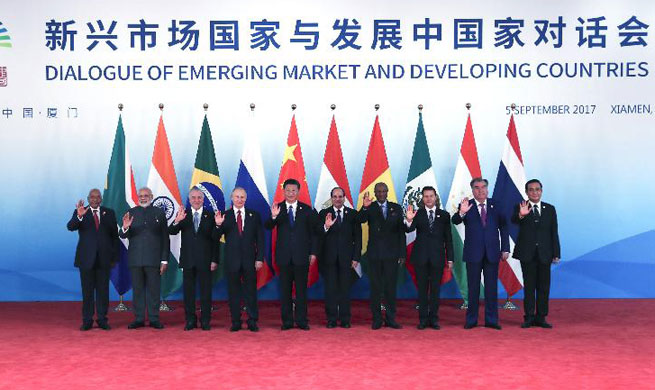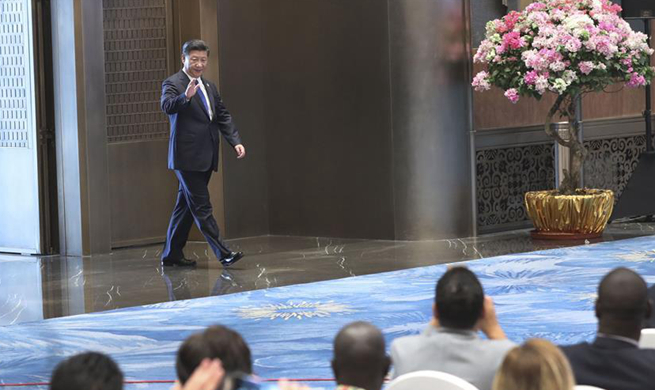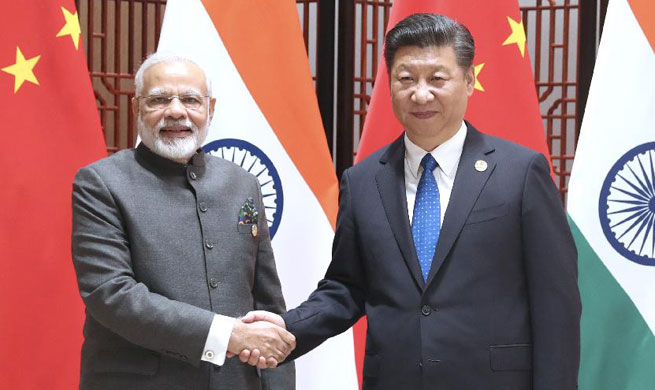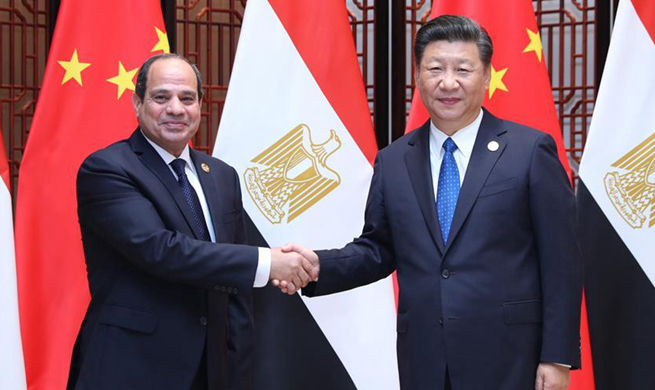BERLIN, Sept. 5 (Xinhua) -- German Chancellor Angela Merkel (CDU) announced her desire to "re-organize" relations between Germany and Turkey at the last plenary session of the current Federal Parliament (Bundestag) on Tuesday.
The comments came just after Merkel belatedly joined a growing choir of German politicians calling for an end to European Union (EU) accession talks with Turkey. Rather than constituting a plea for the de-escalation of Berlin's long-standing diplomatic row with Ankara, however, her words were seen as a veiled threat to Turkish President Recep Tayyip Erdogan.
The Chancellor warned parliamentarians that EU members could "publicly fall-out with each other" before Erdogan's eyes, thus "weakening Europe's position dramatically." Merkel emphasized the need for a unified and firm stance in Brussels on Turkey, noting how she had already ensured that there would be no negotiations over the Turkish-EU customs union during Estonia's ongoing presidency over the EU Council (the bloc's most powerful decision-making body).
The consultation over the future of accession talks had to be continued, she added, including the possibility to "suspend or terminate negotiations."
EVOLUTION OF DIPLOMATIC CRISIS
Merkel's foreboding speech on Tuesday was only the latest episode in a bilateral conflict which can be traced back to a failed military coup against Erdogan's government in July 2016 and has since escalated.
Ankara has rejected Berlin's criticisms that it engaged in an excessive crack-down on political opponents in response to the coup, and is resentful towards Berlin for allegedly granting asylum to Turkish revolutionaries. Figures released by the German Federal Office for Migration and Refugees suggest that the number of Turkish asylum seekers in Germany has risen dramatically since July 2016.
Germany and Turkey also became embroiled in a spat over the plans of Turkish politicians to hold campaign rallies in Europe. Hoping to win support among Turkish migrant communities for a controversial constitutional referendum, which ultimately passed in April 2017, Erdogan and members of his AKP party ran up against heavy opposition in several European capitals.
Turkey retaliated by banning German parliamentarians from visiting German armed forces stationed at the Turkish bases of Incirlik and Konya, which in turn prompted German lawmakers to transfer troops to a new location in Jordan.
Turkish arrests of German citizens are another source of strife. Authorities in Turkey have arrested tens of thousands of people on suspicion of terrorist activity in the wake of the failed military coup. According to the German Foreign Office, there are currently 55 German citizens imprisoned in Turkey, of which 12 were detained on political grounds. An international arrest warrant was further issued for the detention of a German citizen of Turkish origin in Spain last month.
Erdogan further provoked Berlin's ire by urging Germans with Turkish ancestry to boycott certain parties in Germany's national elections in September.
Under mounting pressure to confront Erdogan, Merkel abandoned her traditional conciliatory approach. The Chancellor instead swerved towards what she herself described as a "very hard line" and warned that Germany reserved "the right to take additional measures" if necessary. Swelling tensions between the countries took a personal turn when the wife of German Foreign Minister Sigmar Gabriel was threatened by Erdogan supporters after the foreign minister told German tourists and investors to steer clear of Turkey.
More recently, several leading politicians in Germany have demanded that an ultimatum be imposed on Turkey to release German citizens imprisoned in the country and urged for an immediate halt to EU accession talks, as well as related financial aid, should it not be met.
IS THERE A WAYOUT?
German and Turkish officials are caught in a negative spiral of mutual recriminations for the moment, raising the question of where this worrying development will lead. Judging by the latest change of tone in Germany, more acrimony may well be in store for the two NATO allies.
In the past, Germany and other European states could goad Turkey with the prospect of EU membership. Like all countries seeking to commence negotiations to enter the bloc, Ankara committed, at least on paper, to a wide-ranging set of political and economic reforms which were intended to remodel its institutions along European lines.
These talks offered a useful framework for German politicians to engage with their Turkish counterparts, but this door seems to have been firmly shut. Even if EU members were willing to realistically consider Turkish membership again, it is not at all clear that Ankara is still interested. Erdogan has publicly threatened to end the EU bid, and Turkish politicians said after the United Kingdom voted for Brexit that the bloc was a house of cards on the verge of collapse.
In the meantime, a very different approach towards Turkey has crystallized in Berlin in lieu of being able to offer the incentive of closer European cooperation to reach mutually-acceptable compromises. If Merkel realizes only a fraction of the threats against Turkey currently emanating from Berlin, her government's transformation from appeasement policy to a punitive regime will be complete.
SPD candidate Martin Schulz has long urged Merkel to take a firmer stance against Erdogan.
"A certain type of statesman only understands clear messages," Schulz was quoted saying. The former European Parliament president believes that this strategy will ultimately force Erdogan back to the negotiation table and reduce tensions.
The EU and Germany have significant economic leverage over Turkey, which they could put to similar use. Although tourists already shy away from what was once one of their favored holiday destinations, Turkey continues to receive billions of euros in financial aid from Brussels each year. Ankara is also heavily reliant on Brussels for trade, and follows Brussels' in exchange for privileged access to the single market of more than 500 million affluent consumers.
Demands, such as those made by CSU leader and Bavarian governor Horst Seehofer, for a complete and immediate halt to EU financial aid could only be the prelude to an economic stand-off with the potential to do serious long-term damage to Turkish investment and growth.
But those leverages could be double-edged sword in terms of damages. Such a confrontational strategy also carries two key risks for Germany:
The first is that it could cause the collapse of the existing treaty which governs cooperation between the EU and Turkey on refugee policy, an agreement which Merkel was instrumental in creating. Under the treaty, Ankara has agreed to take back any migrants intercepted between Greece and Turkey. In exchange, Syrian refugees in Turkey are transferred to the EU under an official resettlement program and Brussels grants Ankara financial aid to assist with border policing and integration measures.
The agreement is highly controversial in Germany because it believed it grants Erdogan excessive power over the EU. The Turkish president has publicly threatened to "open the floodgates" and allow migrants into Europe unchecked if Brussels does not hold up its end of the deal.
Such a repeat of the 2015 mass arrival of refugees would be one of very few events which could still derail Merkel on her steadfast march to a fourth term in office. The risk to her political fortunes is not just due to growing unease among German voters over the recent scale of immigration, but also a consequence of the fact that she has repeatedly defended the treaty and claimed it as one of her legislative successes.
Despite Erdogan's dire warnings, however, reneging on the agreement may no longer be as disruptive as it once seemed. Amid an eerie silence on the battlefields of Syria and Iraq, migration routes to Europe have shifted from the Aegean Sea to the coast of North Africa. The EU has also worked feverishly in the last months to intensify naval and border cooperation in the Mediterranean and would hence be in a much better position to react to a potential expiration of the Turkish deal.
The second, and more significant risk, which Germany faces from a further escalation of tensions with Turkey, is therefore related to its population of more than 3 million residents of Turkish descent. On Tuesday, Turkish community representatives in Germany warned that a cancellation of EU accession talks could have unintended consequences. Such a step would weaken opposition forces in Turkey on the one hand, and strengthen right-wing parties in Germany on the other, leaving Germans of Turkish origin vulnerable and alienated.
The comments highlight the potential for social strife, in particular during an age where fears of terrorist attacks have hardened attitudes towards Muslim immigrants in particular. An opinion survey by the Bertelsmann institute recently found that one in five Germans reported not wanting to have Muslim neighbors.
If there is any source of hope that Berlin and Ankara will succeed in mending fences at this point, then perhaps it lies in their mutual domestic vulnerabilities. Turkish politicians do not want their country to become economically isolated, while German officials are keen to preserve social stability at home. This circumstance could yet pave the way to verbal disarmament and a re-organization of diplomatic relations along its earlier, more cordial, lines.

















